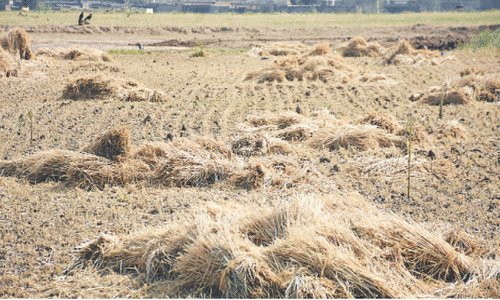The scene is grimly familiar, as is the location. A market has been struck in Parachinar — the second market bombing this year in the town and the fourth since 2013.
The Friday bombing, likely aimed at inflicting maximum harm ahead of the weekly congregation at a nearby Shia imambargah, further crystallised what has long been clear about the violence in the Parachinar region of Kurram Agency: militancy with an overtly sectarian dimension. And after rival claims to this year’s January bombing in the area, yesterday’s attack has been followed by a claim of responsibility from Jamaatul Ahrar, the TTP splinter that has been at the forefront of recent attacks across the country. The long war against militancy, longer in the Parachinar region than most parts of the country, looks set to grind on, undermining the gains made elsewhere.
For Pakistan, the questions are many, and all wearily familiar. The tone of the political leadership may have changed somewhat since earlier this year, when senior government officials openly and at odds with the facts tried to downplay the sectarian underpinnings of militancy, but there is no clear path ahead either. Perhaps nowhere is the connection between extremism and militancy more apparent than at the sectarian intersection. While the roots of the animosity may indeed be historical, stretching back many centuries as some government officials glibly claimed, it is actively encouraged by a vast infrastructure of extremism. The tentative steps taken under the National Action Plan and by provincial governments to fine or arrest preachers of hate has done little to slow the poison being spread across the land. The need for an unequivocal, firm and determined message — that Pakistan is and will remain an inclusive state and society — remains as strong as ever. What the message must be is clear; whether the state has the will or ability to carry it forward until it becomes uncontested and undeniable across the country is unclear.
There is also the problem of the state choosing to emphasise one part of the problem and in doing so distorting the real scope of militancy. With Jamaatul Ahrar claiming responsibility for yesterday’s attack, the problem of cross-border militancy and Pakistan’s growing discontent with Afghanistan will likely come into focus again. But terrorism and militancy blighted Parachinar before the emergence of Jamaatul Ahrar, and the relationship with Afghanistan is far more complex than the now undeniably serious problem of anti-Pakistan militant sanctuaries in eastern Afghanistan. The answer lies in drawing together seemingly disparate threads such as NAP, Operation Raddul Fasaad, and national security and foreign policy into a coherent, effective and strategic approach. It will not be easy, but there is also no realistic alternative. The suffering in Parachinar must not be in vain and with no end. The ugly reality of sectarianism must be confronted directly and decisively.
Published in Dawn, April 1st, 2017















































